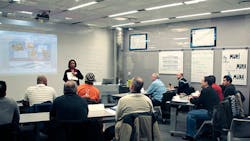Chrysler's 'World Class Manufacturing' Program a Key to Profitability
PLYMOUTH, MICH. -- A key to Chrysler Group's return to profitability is a plant performance improvement program developed by parent company Fiat SpA (IW 1000/87) , said Mauro Pino, the company's head of World Class Manufacturing at a conference in Plymouth, Mich., Thursday.
Chrysler first implemented Fiat's program, called World Class Manufacturing , three years ago as a continuous-improvement system focused on all plant processes, including safety, maintenance and quality. As an offshoot of the program, Chrysler opened in January a learning center called the World Class Manufacturing Academy in Warren, Mich.
The academy has helped the company save more than $1 million since it opened, said Pino, who spoke at the manufacturing conference hosted by IndustryWeek and the Italian Trade Commission. The company recorded net income of $473 million in the first quarter, its best result since formation of the new Chrysler Group in 2009.
Chrysler expects $2.5 million in savings related to the program by the end of 2012, Pino said.
World Class Manufacturing focuses on eliminating nonvalue-added activities by delivering parts to employees, Pino said. Through the system, Chrysler has identified a 60-degree window called "the golden zone" that is the ideal range for presenting parts to an individual operator.
"We want to pay the employee for working, not walking," Pino said. "And the customer expects to pay for the bolt that a worker screws on but not for the time spent retrieving the part."
One of the key improvements cited by Pino was a project initiated by an employee at Chrysler's Indiana Transmission Plant in Kokomo, Ind. The plant worker, Tracey Aber, and his team utilized a methodology he learned at the academy to identify the root cause of a problem that caused pallets to stop the line approximately 15 times a day, Pino said.
By analyzing the issue using World Class Manufacturing tools, Aber and his team implemented two countermeasures that dampened the pallets' impact and eliminated a recoil effect. The improvement resulted in zero machine micro-stops for three months, Pino said.
Employees have been receptive to the program, Pino said. Acceptance from Chrysler's unions in the United States and Canada were keys to the program's success, Pino said.
"It is a win-win because management recognizes we need the knowledge, experience, creativity and dedication of unionized workers," he said. "And the unions realize that the well-being of their members is tied to Chrysler's success."
Through June, approximately 1,500 employees have attended training sessions at the academy.
About the Author
Jonathan Katz
Former Managing Editor
Former Managing Editor Jon Katz covered leadership and strategy, tackling subjects such as lean manufacturing leadership, strategy development and deployment, corporate culture, corporate social responsibility, and growth strategies. As well, he provided news and analysis of successful companies in the chemical and energy industries, including oil and gas, renewable and alternative.
Jon worked as an intern for IndustryWeek before serving as a reporter for The Morning Journal and then as an associate editor for Penton Media’s Supply Chain Technology News.
Jon received his bachelor’s degree in Journalism from Kent State University and is a die-hard Cleveland sports fan.
